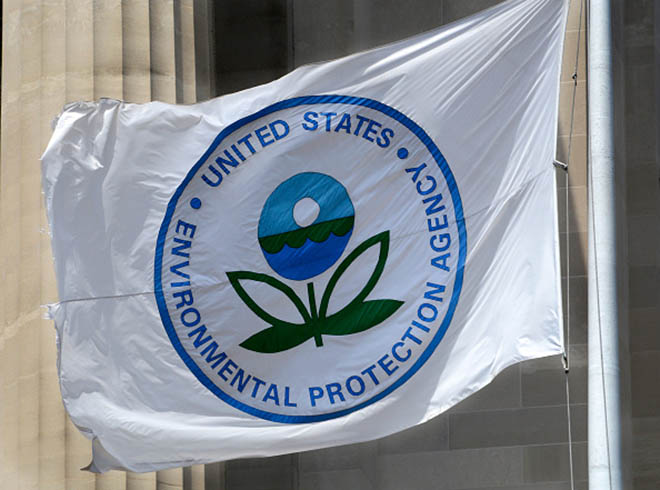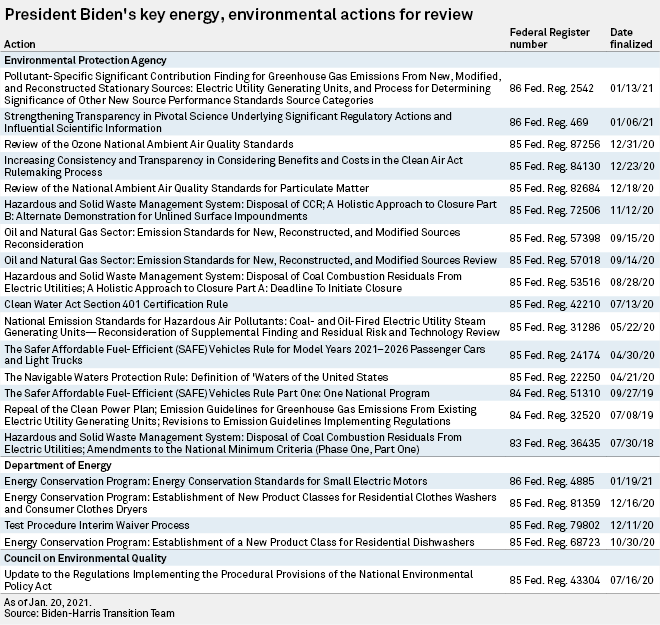S&P Global Offerings
Featured Topics
Featured Products
Events
S&P Global Offerings
Featured Topics
Featured Products
Events
S&P Global Offerings
Featured Topics
Featured Products
Events
Banking & Capital Markets
Economy & Finance
Energy Transition & Sustainability
Technology & Innovation
Podcasts & Newsletters
Banking & Capital Markets
Economy & Finance
Energy Transition & Sustainability
Technology & Innovation
Podcasts & Newsletters
S&P Global Offerings
Featured Topics
Featured Products
Events
20 Jan, 2021
By Zack Hale and Molly Christian

| Newly inaugurated U.S. President Joe Biden is directing the Environmental Protection Agency to review dozens of existing regulations finalized under the Trump administration, including several for the energy sector. Source: Robert Alexander/Archive Photos via Getty Images |
U.S. President Joe Biden has teed up nearly 50 U.S. Environmental Protection Agency rules for review, including major Trump-era energy- and climate-related rollbacks for power plants and the nation's transportation sector.
Under an executive order to be signed late afternoon on Jan. 20, Biden's administration also plans to revisit rules finalized in the waning weeks of the Trump presidency aimed at limiting the EPA's use of science and its consideration of public health benefits tied to reductions in harmful air pollutants, according to a fact sheet Biden's transition team released early on Inauguration Day.
While former President Donald Trump waited until March 2017 to initiate the repeal and replacement of the Obama-era Clean Power Plan, the nation's first federal set of climate regulations for existing fossil fuel-fired power plants, Biden wasted no time in directing the EPA to revisit his predecessor's replacement for that rule.
The Jan. 20 executive order will follow a federal appeals court ruling issued a day earlier that vacated the Trump administration's replacement regulation — the Affordable Clean Energy, or ACE, rule — after a split panel found that it rested on an impermissibly narrow reading of the Clean Air Act.
Legal experts have suggested the ruling opens the door to bold action under the statute by the Biden EPA to regulate existing power plants for climate pollution.
Biden's executive order will also target another signature Trump-era deregulatory effort: a pair of final rules that weaken Obama-era vehicle emission standards and strip California of its waiver authority to set its own tough tailpipe rules.
With the U.S. transportation sector now the nation's leading source of greenhouse gases, tighter vehicle emission standards with an emphasis on electric vehicles represent one of the Biden administration's greatest opportunities to cut carbon emissions in connection with rejoining the Paris Agreement on climate change.
Moreover, the executive order is set to take aim at a so-called "science transparency rule" that requires the EPA to give more weight to health studies where the underlying medical data is publicly available. While the Trump administration championed the regulation as necessary to boost public confidence in EPA rules, critics saw it as an attempt to tie the hands of future administrations wanting to promulgate energy and climate regulations.
Along with the science transparency rule, the executive order will address a final rule that requires the EPA to separately report public health co-benefits flowing from Clean Air Act rules, a measure seen as potentially problematic for Biden's climate agenda.
Additional Clean Air Act rollbacks, including a revised finding that scrapped the legal basis for Obama-era mercury controls on power plants, are also covered by the executive order. Some of the regulations identified in the order could also be rescinded with simple majority votes in the Democratic-controlled U.S. Senate and House of Representatives.
DOE, other rules for review
Along with the review of EPA rules, Biden directed the U.S. Department of Energy to reconsider several energy-efficiency and conservation standards. The reviews pertain to energy conservation standards for small electric motors and residential clothes washers, dryers and dishwashers, among other things.
Efficiency advocates have called on Biden to strengthen appliance standards to reduce electricity demand and consumers' utility bills while lowering emissions.
By updating dozens of DOE appliance and equipment efficiency standards, the agency could reduce cumulative carbon emissions by 1.5 billion to 2.9 billion metric tons through 2050, according to a study released in November 2020 by the Appliance Standards Awareness Project and the American Council for an Energy-Efficient Economy. Such carbon savings would be the equivalent to retiring about 13-25 average-sized coal-fired power plants during the same period, the report said.
Biden's Jan. 20 executive order will also instruct the White House Council on Environmental Quality to reconsider the Trump administration's effort to overhaul agencies' implementing rules for the National Environmental Policy Act.
A final regulation issued by the council in the summer of 2020 sets a goal of completing environmental reviews for major infrastructure projects within two years, a change welcomed by developers. But advocacy groups have argued the changes would limit public participation in a way that could harm human health and the environment.

